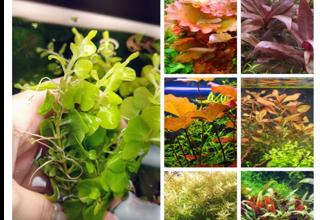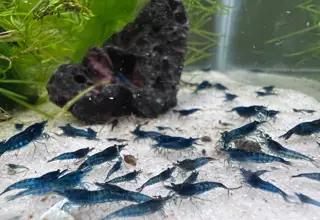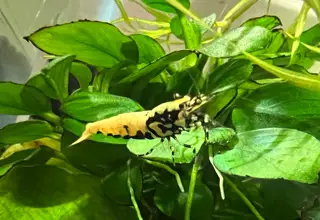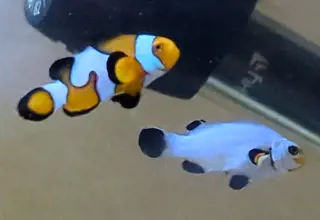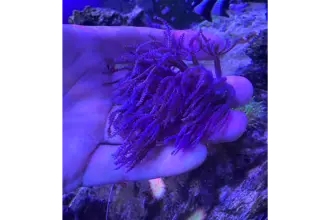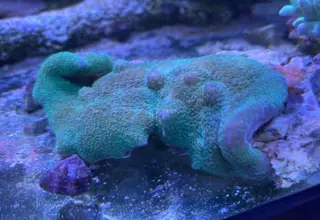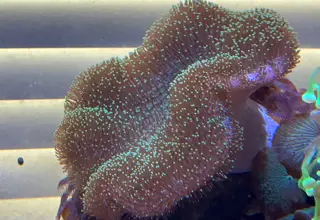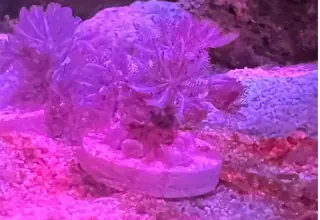Lawnmower Blenny: Diet, Reef Compatibility, Tank Size & More
Posted by on 5/06/2023
We use affiliate links and may receive a small commission on purchases.
The Lawnmower Blenny (scientific name: Salarias fasciatus) is a fascinating fish with a big appetite. Hobbyists will appreciate the fish's near-constant feeding, as the species will kick up detritus along the sandbed, improving the aquarium's filtration.
However, keeping this fish in captivity can be a challenge. The fish has unique dietary and tank size requirements, and should only be kept with fish that share a similar temperament. In this guide, we'll discuss how to care for the Lawnmower Blenny, and provide guidance for hobbyists considering the species as their potential next fish.
Species Summary
The Lawnmower Blenny (scientific name: Salarias fasciatus) is also known as the Jewelled Blenny, Sailfin Blenny, and Algae Blenny. The fish is native to the islands of Micronesia, where it can be found swimming in shallow waters, roughly 26 feet below the ocean's surface.
First scientifically classified by German naturalist, Marcus Elieser Bloch , the fish tends to dwell in areas covered in algae, a large part of their overall diet.

Appearance
The Lawnmower Blenny shares a similar body shape as the other fish under the Blenniiformes order . The fish has a long, torpedo-like appearance, and sports a tan coloration adorned with iridescent spots on the face and eyes. The body of the fish features a banded pattern broken up by tan-colored spots.
The fish has a continuous dorsal fin that spans the length of the fish. This fin, as well as the caudal, tail, and pelvic fins, are all semi-translucent and feature a similar banded pattern.

Male vs Female
Hobbyists looking to differentiate male lawnmower blennies from females should look to the spines on their anal fins. Females will have two spines, with one being larger than the other. While in males, both spines will be equal in length.
Size
Lawnmower blennies aren't the largest fish, and will only grow to reach about 5 inches in length.
These fish typically reach their adult size at around 18 months, when they're considered to be sexually mature.
Lawnmower Blenny Care
Given a proper environment, the Lawnmower Blenny is relatively easy to care for. However, hobbyists should be aware of their dietary requirements. These fish will need more than natural algae to feed upon.
Hobbyists will want to create an environment similar to the shallow waters from which these fish can be found.
Lifespan
Lawnmower blennies have a relatively short lifespan and typically live for an average of 3-5 years in captivity.
As with all fish, diet and a pristine environment will give your lawnmower blenny the best shot at reaching its full life expectancy.
Tank Size
A single Lawnmower Blenny should be kept in an aquarium no smaller than 30 gallons in size.
The fish's small size makes them an excellent candidate for a nano-sized aquarium.
Avoid adding more than one lawnmower blenny to an aquarium, as they'll become quite aggressive toward one another.
Acclimation
Lawnmower blennies should be drip acclimated, using a drip acclimation kit . After 30 minutes of being drip acclimated, hobbyists can catch the fish with a net and introduce them into a quarantine tank or display tank.
Hobbyists should also consider introducing these fish into an acclimation box , which provides a safe environment for them to be introduced to other members of the tank.
Water Conditions
While an improper diet is often the leading cause of death for Lawnmower Blennies, hobbyists will still want to maintain optimal water conditions.
Maintain these parameters for the duration of your Lawnmower Blenny's life:
Ammonia: 0ppm
Nitrite: < .2ppm
Nitrate: < 10ppm
Specific Gravity: 1.020-1.025
Temperature: 72°F-78°F
dKH: 8-12 dKH
pH: 8.1-8.4
We strongly recommend testing salinity levels with a test kit , and pH levels via an accurate pH meter .
Tank Setup
Lawnmower blennies are used to large amounts of rock, which play host to a variety of different types of marine algae. Hobbyists will want to form plenty of crevices and small caves using rock work for these fish to hide in. Live rock should be positioned so that it serves as an area of refuge, while also providing additional surface area for algae to grow.
A tight-fitting lid is a must, as these fish will jump out of an aquarium. In the wild, these fish frequently jump out of the water to reach other food-rich areas of the coral reef.
Although a sand substrate isn't a requirement, they'll frequently be seen lounging on the sandbed, but won't sift sand like a goby, such as a yellow watchman.
In terms of flow, Lawnmower blennies are quite adaptable and will accept a variety of different flow conditions.
Common Diseases
Lawnmower blennies are known for their resilience towards certain diseases and infections, but that doesn't make them completely immune. Marine velvet disease and ich are two of the most common diseases in marine fish that require immediate treatment.
Finrot, often a result of malnourishment, is more commonly seen in lawnmower blennies due to their dietary requirements.
Food & Diet
One of the most important parts of owning a Lawnmower Blenny is providing the fish with an ideal diet. Many hobbyists misunderestimate the sheer amount of algae they'll need to maintain a healthy appearance. In the wild, these fish rasp on rocks all day long, and will behave similarly in captivity.
While they'll consume nutrient-rich flake and pellet food, as well as frozen foods such as mysis and brine shrimp, once they've tasted these new food sources, they may never go back to eating algae. Feeding behaviors vary between individual fish, and hobbyists will need to manage the quantity of algae in their tanks with any additional food they'll need to supplement. If done correctly, the lawnmower blenny should always maintain a healthy appearance.
Behavior and Temperament
Lawnmower blennies have fascinating personalities to observe. They're often found perched on top of live rock, observing interactions throughout the aquarium. They're peaceful towards other fish with a similar temperament and although these fish will show aggressive behavior towards their own species, they are capable of co-existing with other blennies that demonstrate stark differences in appearance.
Reef Compatibility
Hobbyists should use caution when deciding whether or not a Lawnmower blenny should be added to a reef aquarium. Although rare, these fish can develop an appetite for coral polyps, such as those seen on acropora and montipora.
In most cases, hobbyists can mitigate any coral compatibility issues by making sure their lawnmower blenny is consistently well-fed. While it can be difficult to predict a lawnmower blennies dietary preferences, having one develop an appetite for coral is quite rare.
Tank Mates
Hobbyists will want to avoid adding additional lawnmower blennies to their aquariums, as well as aggressive fish such as the Tessalata Eel or Blue Spotted Puffer.
Aquarium fish that also exhibit a peaceful temperament make excellent tank mate options. Any of the following should work well provided a large enough aquarium.
Breeding
Although we've seen these fish spawn in captivity, there have been no successful reports of hobbyists raising the fry into adult fish.
We have seen captive-bred blennies from Ora , and hopefully, we'll see the Lawnmower Blenny receive a captive-bred designation in the near future.
Where to Purchase
We recommend purchasing the Lawnmower Blenny from trusted online retailers and experienced hobbyists. We've seen these fish go up for sale on our marketplace, but hobbyists should consider phoning up their local fish stores to see if the species is in stock.
Hobbyists should always inquire about the fish's current water conditions before acclimating.
Conclusion
Lawnmower Blennies are attractive, peaceful fish that will make a great addition to any appropriately sized aquarium. We guarantee that you'll love all this fish has to offer, whether it's rasping on algae or perched on top of live rock, the lawnmower blenny is a species you won't regret purchasing.
Now that we've covered this fish's care requirements, do you plan on picking one up in the near future? Let us know in the comments, and be sure to check out our marketplace and community forum where you can discuss marine aquariums with similar hobbyists.
